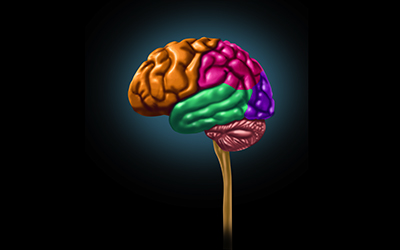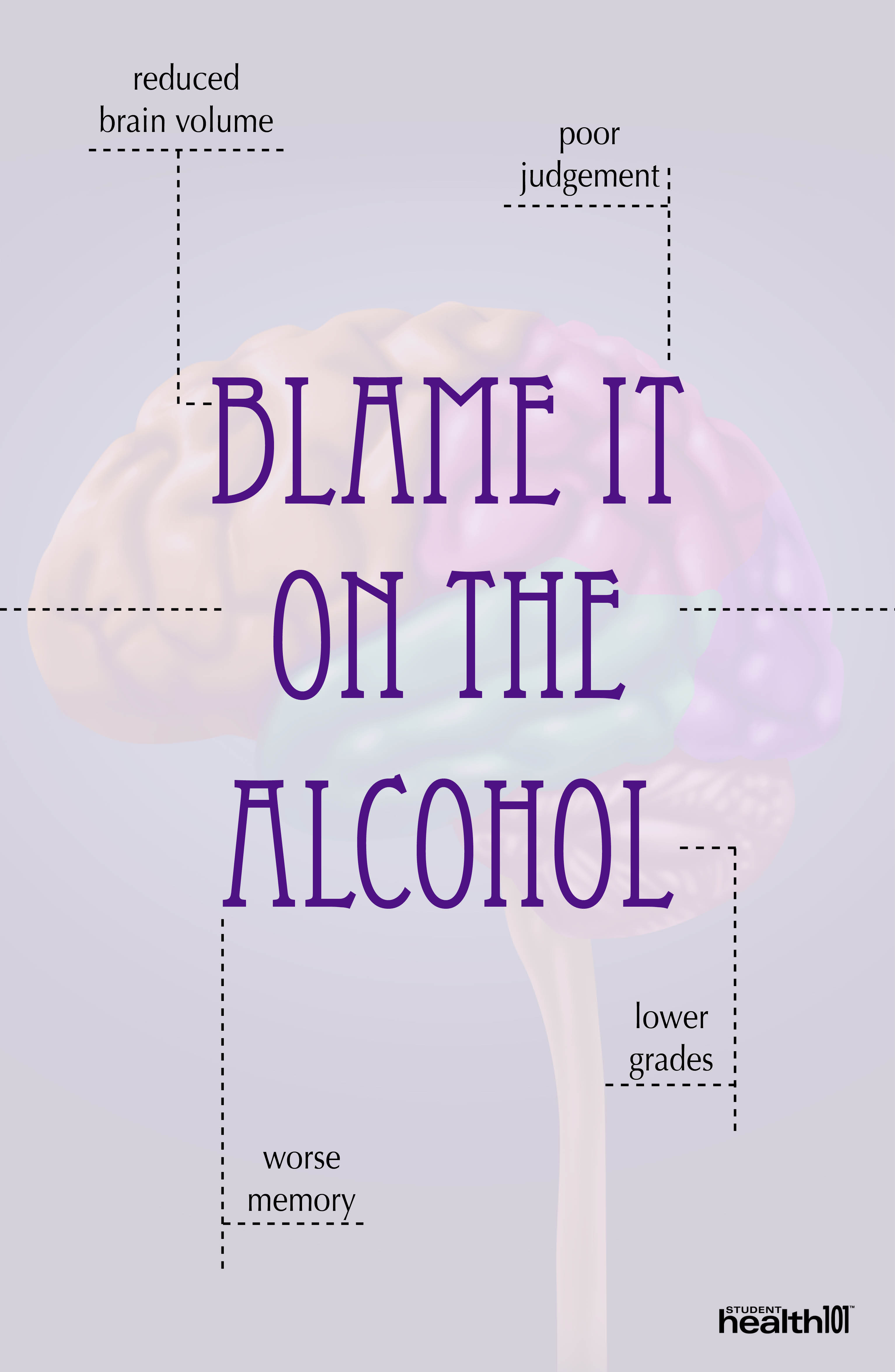The academic hangover
How your brain is affected by drinking

After a long, hard day some of us look forward to unwinding with a drink or two. No big deal. We’re over the legal drinking age. We can still function and we’re mentally healthy, right?
Tread carefully. Be aware that those few drinks might be equivalent to a binge. Research is yielding troublesome findings about the effects of binge drinking on our brains—not just the night of, or the morning after, but well into the week, when we’re supposed to be concentrating on our academics, jobs, and families.
studentvoice

What exactly is a binge?
Binge drinking, or heavy drinking, is defined by the National Institute on Alcohol Abuse and Alcoholism (NIAAA) as a pattern of consuming four or more drinks over the course of two hours on a single occasion for women, and five or more men. It generally increases blood alcohol levels to at least 0.08 percent, the legal intoxication limit in most states.
Binge drinking is most prevalent among 18—34 year olds, according to a 2012 report by the Centers for Disease Control and Prevention.
Not sure whether you binge? A self-diagnostic alcohol screening test.
How many students identify as binge drinkers?
Of 350 nontraditional students who responded to a recent Student Health 101 survey:
- 8 percent self-identified as binge drinkers.
- 7 percent picked the correct definition of binge drinking from a list of six options.
When asked how often they drank 4+ alcoholic drinks (women) or 5+ (men) within two hours (the definition of binge drinking),
- 62 percent said never
- 29 percent said once a month or less frequently
- 9 percent said more frequently than once a month
The effect on our brains, grades, and safety
While some binge drinkers can appear clinically healthy, their brain chemistry may be compromised.
Our brains aren’t fully developed until our mid-twenties. The frontal lobe, which matures relatively slowly, is responsible for “functions such as information processing, decision-making, and impulse control,” says Dr. Yasmin Mashhoon, a neuroscientist at McLean Hospital in Belmont, Massachusetts, and Harvard Medical School in Boston. The frontal lobe is particularly sensitive to alcohol binges during young adulthood. The brain, as a whole, remains vulnerable even after it’s fully developed.
“Alcohol use in young drinkers is associated with a reduction in some cognitive functions, such as working memory, by approximately 10 percent,” says Dr. Marisa Silveri, also a neuroscientist at McLean Hospital, and associate professor of psychiatry at Harvard Medical School. Those effects linger up to several days after drinking.
“It could translate to the difference between an A and B or passing versus failing—or more importantly, making safe choices versus failing to inhibit poor choices, like driving while intoxicated,” says Dr. Silveri.
Altered brain structure and function
In a recent study, Dr. Silveri and her colleagues compared the brain structure and certain cognitive skills of light drinkers and heavy drinkers aged around 22. The light drinkers reported consuming 1½ drinks per week during the previous three months. Heavy drinkers had consumed nearly 12 drinks a week in the same period. Among the heavy drinkers, the cortical thickness, or outer brain volume, was significantly reduced compared to the light drinkers.
Self-control and judgment
What does that mean? Among the heavy drinkers, researchers found impaired control, self-perception, and self-care; greater risk-taking; and worse academic or occupational consequences compared to the light drinkers.
Brain health
They also found lower levels of GABA (gamma-Aminobutyric acid), the most important inhibitory (calming) neurotransmitter, in the frontal lobe. Deficiencies in GABA are associated with a range of psychiatric disorders including depression, anxiety, and insomnia. In addition, the heavy drinkers had lower levels of the metabolite NAA (N-acetylaspartate). Deficiencies in NAA are associated with impaired neuronal health (the integrity of brain cells).
Memory and learning
The team also found that binge drinking affects the hippocampus region of the brain, which is responsible for long-term memory, recall, and recognition. After taking verbal learning tests, the heavy drinkers recalled 14 percent fewer words and performed relatively poorly on word recognition compared to the light drinkers.
Adults in their early to mid-twenties appear particularly vulnerable to the effects of heavy drinking on memory acquisition, according to earlier research.
Cause and effect
Does heavy drinking cause these effects in the brain, or are people with these brain differences predisposed to heavy drinking? Animal studies show that binge drinking leads to comparable brain changes. Human studies to clarify cause and effect are in the planning stages.
The risk to young women
Recent decades have seen a dramatic rise in heavy drinking among young women. Twenty-four percent of US women aged 18—24 and 20 percent of women aged 25—34 self-reported as binge drinkers in 2011, according to analysis of the Behavioral Risk Factor Surveillance System, a nationwide survey. (Of course, this leaves large majorities who did not.) Women living in households making $75,000 or more were the most likely to drink heavily.
Why are women at risk for heavy drinking?
- “Lower GABA levels during the luteal phase, or the latter phase of the menstrual cycle, make women more at risk for alcohol abuse,” says Dr. Silveri.
- Women have a higher blood alcohol content than men after drinking the same amount, even after accounting for body weight and food consumption. That’s because women have less body water than men, and lower levels of alcohol dehydrogenase, an enzyme that breaks down alcohol.
- “New alcoholic beverages have been developed and marketed (e.g., flavored malt beverages) that are known to appeal to underage girls,” says Dr. Dafna Kanny, senior scientist in the Alcohol Program at the Centers for Disease Control and Prevention.
- The last few decades have seen an increasing social acceptance of alcohol consumption among women.
What do students say about the effect of alcohol on academic performance?
In a recent Student Health 101 survey, 64 percent of 350 nontraditional students thought getting drunk affected their academic performance over the next few days.
“I don’t feel smart enough to read a book, and definitely not smart enough to write a paper.”
—Second-year student at Moorpark College, California
“Grogginess. More difficult to connect ideas and remember materials learned the previous day. Less able to persevere through an intense work day.”
—Fourth-year graduate student at the University of Manitoba, Canada
“I’m a reformed alcoholic so I’m well aware of the effects. Can’t focus, no motivation, studying is impossible, mood swings.”
—Second-year student at Wake Technical Community College, Raleigh, North Carolina
“I find myself less able to concentrate on my work and less capable of remembering details and information.”
—First-year graduate student at Trent University, Ontario, Canada
“I’ve just noticed all people do is complain about their hangover instead of doing what they’re supposed to be doing.”
—Third-year student at the College of Southern Idaho in Twin Falls
How accurately do college students perceive each others’ drinking habits?
Students tend to vastly overestimate the extent of each other’s drinking. A lot more of you are sober than you think, according to the American College Health Association—National College Health Assessment, spring 2013.
|
Students’ guesstimate |
Reality |
Students who said they’d never used alcohol |
4 percent |
22 percent |
Students who said they’d drunk alcohol within the last 30 days |
|
|
studentvoice







